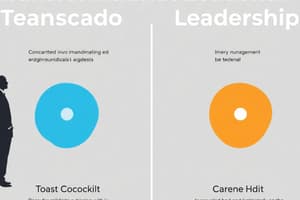Podcast
Questions and Answers
Which leadership style is characterized by leaders allowing group members to make the decisions?
Which leadership style is characterized by leaders allowing group members to make the decisions?
- Facilitative leadership
- Transactional leadership
- Coaching leadership
- Laissez-faire leadership (correct)
What is the primary focus of coaching leadership?
What is the primary focus of coaching leadership?
- Inspiring others through charisma and communication
- Envisioning the future and disrupting the status quo
- Achieving results through strict supervision and rewards/punishments
- Developing team members by teaching and mentoring them (correct)
Which leadership style is described as being futuristic, innovative, and imaginative?
Which leadership style is described as being futuristic, innovative, and imaginative?
- Visionary leadership (correct)
- Facilitative leadership
- Charismatic leadership
- Transactional leadership
What is the primary goal of transactional leadership?
What is the primary goal of transactional leadership?
Which leadership style is known for its emphasis on collaborative decision-making?
Which leadership style is known for its emphasis on collaborative decision-making?
Which leadership style empowers people to create a vision and execute positive change?
Which leadership style empowers people to create a vision and execute positive change?
What is the primary focus of team leadership?
What is the primary focus of team leadership?
In a globalized market, why is cross-cultural leadership important?
In a globalized market, why is cross-cultural leadership important?
What does facilitative leadership involve?
What does facilitative leadership involve?
What is a key characteristic of transformational leadership?
What is a key characteristic of transformational leadership?
Flashcards are hidden until you start studying
Study Notes
Leadership Styles
- Facilitative leadership involves collaborative leadership, balancing content and process of group discussions, and ensuring everyone is involved in decision-making.
Laissez-Faire Leadership
- Laissez-faire leadership, also known as delegative leadership, involves leaders being hands-off and allowing group members to make decisions.
- Research shows this style leads to the lowest productivity among group members.
Transactional Leadership
- Transactional leadership is a structured approach that relies on rewards and punishments to achieve goals.
- It is results-oriented and works well with self-motivated employees.
- Employees are given short- and long-term goals and expected to work under supervision, adhering to strict guidelines.
Coaching Leadership
- Coaching leadership focuses on developing team members through teaching, mentoring, and guidance.
- Coaching leaders recognize team members' strengths, weaknesses, and motivations to help them improve.
- They provide guidance and support to help team members improve their skills and performance.
Charismatic Leadership
- Charismatic leadership involves using communication skills, persuasiveness, and charm to influence others.
- Charismatic leaders are valuable in organizations facing crisis or struggling to move forward.
Visionary Leadership
- Visionary leadership is futuristic, innovative, and imaginative, with a focus on making a positive impact.
- Visionary leaders have a compelling vision of the future and imagine new ways to achieve it.
Transformational Leadership
- Transformational leadership empowers people to accomplish positive change.
- Transformational leaders inspire and motivate team members to create a vision and execute change, increasing morale, innovation, conflict resolution, and ownership.
Team Leadership
- Team leadership involves guiding and inspiring a group towards achieving common goals.
- Team leaders provide guidance, instruction, direction, and leadership to a group, fostering collaboration and nurturing individual strengths.
Cross-Cultural Leadership
- Cross-cultural leadership involves influencing and motivating a culturally diverse group towards a common goal.
- Cross-cultural leadership requires understanding and appealing to the shared knowledge and meaning systems of the group members.
Facilitative Leadership
- Facilitative leadership involves providing direction without taking control.
Studying That Suits You
Use AI to generate personalized quizzes and flashcards to suit your learning preferences.



